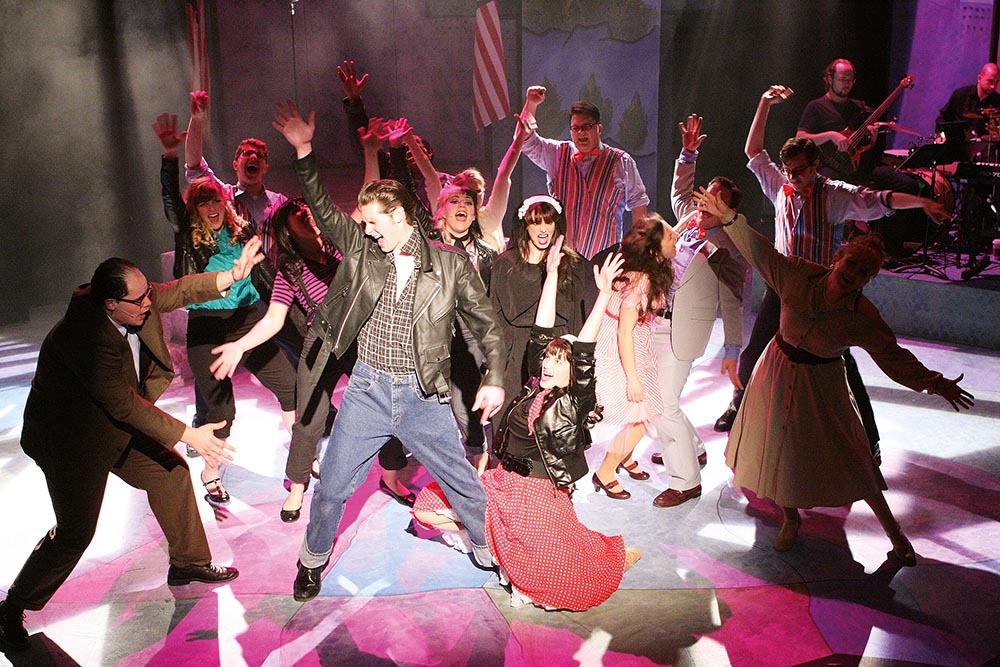Among those, in Miller’s rather lonely estimation, is Cry-Baby, a stage version of the John Waters film with music by Fountains of Wayne’s lead songwriter, Adam Schlesinger, and lyrics by “Daily Show” writer David Javerbaum. The Broadway production, widely perceived as a craven attempt to fashion another Hairspray, closed after just a few months in 2008. Miller feels that the show, essentially a campy shotgun wedding of Grease and West Side Story, was overblown and misdirected on Broadway. Though Javerbaum and Schlesinger don’t entirely agree, they did jump at the chance the New Line production gave them to fix one thing. New Line’s house band maxes out at six players—and that was just fine with Cry-Baby’s songwriters.
“I thought the Broadway orchestra was too big for what is essentially a rockabilly show, although we had no choice because of the house minimum rules,” says Schlesinger, who with Javerbaum paid to have new six-piece arrangements made of the score for the New Line production; those arrangements are now the basis of tracks for the show’s long-overdue cast album. Schlesinger also traveled to St. Louis to see New Line’s production and reports, “It was great, and it showed us that Cry-Baby can work as a smaller production and with a smaller band. In fact, that’s how I hope it is done in any future productions.”
Small can indeed be better, and not only for the rock shows. The theatre’s current venue, a 210-seat auditorium near the campus of Washington University, is just the latest in a series of cozy spaces New Line has called home, recalls the Post-Dispatch’s Judith Newmark.
“Scott makes a big advantage of intimacy,” says Newmark, who in March helped ensure that the St. Louis Theater Circle Awards gave Miller a special award for his body of work. “I remember Sweeney Todd in a church basement so small that when the sailor was singing to Johanna, I could have touched him. And when you bring these shows down to that scale, it changes all the proportions—changes your relationship to the story, to the characters, to the music.”
The relationship that Miller has forged over time with an informal repertory of performers, and more crucially with his audience, is also one that sets his theatre apart, Newmark says.
“When he does a show like Hair or Bat Boy, you have a feeling of the cult spreading from the stage into the audience,” Newmark says. “We’re not just seeing Bat Boy—we’re seeing Scott’s Bat Boy.”
Miller’s personality isn’t just stamped all over New Line: He is the theatre’s only full-time staff member, and, judging from the car he drives, most of the theatre’s annual $100,000 budget is poured into New Line’s three annual productions. In addition to his informal repertory acting company and various assistant directors, he had, until recently, the versatile Justin Smolik as resident music director (Smolik left for another job). Lest this sound like a seat-of-the-pants, Mickey-and-Judy-level enterprise, Sarah Porter, resident costumer and frequent performer—she recently starred as Maureen in Rent—hails the company’s “level of organization and respect for people working there. It makes it a great home.”
Organization comes in handy when faced with one easy-to-overlook challenge presented by staging brand-new musicals, some of them not yet officially licensed: The scripts and scores are seldom in pristine, ready-to-disseminate condition. Quips Porter, “Some of these scripts have hand-written notes from the oboe player in the margins. With shows that closed quickly, it’s like everybody put their scripts down and walked away and said, ‘Somebody can use this.’”
That’s required some agile improvisation, says music director Smolik. The final six-piece rearrangements of the Cry-Baby score, he recalls, “weren’t delivered via Dropbox until the last week of tech rehearsal and two days before our first preview—it was nerve-wracking, to say the least.”
Such are the sacrifices, material and procedural, of gambling on non-commercial musicals on a shoestring budget in an urban center that’s not New York. If this is a Golden Age, at New Line it’s being done on the cheap. Miller is pulling off the feat, according to Newmark, of “demonstrating that you can draw an audience in the Middle West with the kind of work that makes you think, ‘Only in New York.’”



